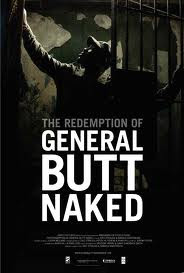By Thomas S. Green
At the festival there were a number of films that set out to provoke thought and raise important questions about various viewpoints. How To Die in Oregon made a case for allowing the right to die through assisted suicide. Had I viewed the film, I have no doubt that I would have been challenged by it. Films like Hell and Back Again and Martha Marcy May Marlene might have provided questions I would have had to wrestle with, if I would have been able to stay awake in during their midnight screenings. Of the films I did screen, one challenged me in a personal way that I’m still contemplating.
The Redemption of General Butt Naked tells the story of Joshua Milton Blahyi, a former mass murder who experiences a dramatic conversion to Christianity. Echoing a story very similar to the conversion experience of Paul in the bible, the film asks many questions of it’s audience. According to the filmmakers Daniele Anastasion and Eric Strauss during the post film discussion, say that what they most wanted to do with the film was raise the question of whether or not a person like Joshua can be changed. While this was the question was the primary question the filmmakers wanted to provoke, I found that myself and the people I talked with were facing other questions the film brought up.
What stuck with me from the film was the question of whether or not there are people in my past that I need to make amends with, and whether I would be willing to face them and take ownership for the wrongs that I’ve committed. It was a question that I knew would take time to probe and one with which I am still dealing.
After the screening I talked with various people who were challenged and wrestled with their own personal questions. A lady I talked with stated she opposes the death penalty and believes in forgiveness, but forgiving someone who had killed 20,000 people was something she wasn’t sure about. She said that it was a question that she would be processing for awhile. In another conversation I spoke with a guy who didn’t think that Joshua should be executed, but that maybe he should be locked away for the rest of his life. In probing further he admitted that incarceration really wouldn’t be justice, but that he wasn’t sure what justice would be or if it was even possible. It was exchanges like these and many, many others that proved to be one of the main values of Sundance.
Thomas S. Green is a recent graduate from the MFA Communications and the Arts program at Regent University. Thomas is passionate about filmmaking and exploring opportunities on how faith can be incorporated into the arts. He has moved back to his hometown, Cincinnati, where he is currently working on multiple film projects.



No comments:
Post a Comment